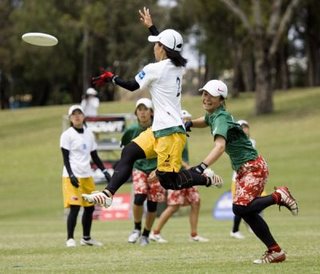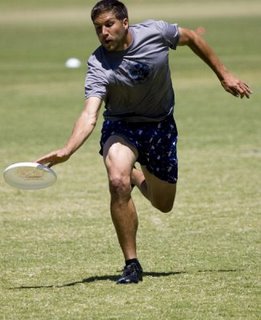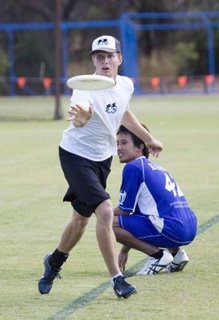In the last round:
- Sub Zero eliminates BAT (86%-14%)
- Condors eliminates Horseshow (69%-31%)
Group 1

Group 2
I have many opinions. They use to be about Ultimate, but now they've expanded.
In the last round:

Hey Folks,
I arrived back in Toronto this morning from my trip out to the UCPC'07 (as I like to call it). In all, it was a good experience. This my perspective on the conference (others: Cooke's and parinella's blog: UCPC, Day 1)
With a 13 hour bus trip in each direction, I can't say I was in the best mind set for a conference. I arrived in Newton, MA around 8 on Friday. I met George Cooke for the first time in person, and the car was filled with Emily Baecher and Kitt Hodsden. We got to the hotel and I met some more people at a small get together, including the other organize Tiina Booth.
My roommate, Josh Seamon a Vermont high school coach, and I arrived at the high school the next day for the conference. I attended 5 sessions (and had my own talk):
Before new years, I received an e-mail from Daniel Crenna. He was asking if I knew about some places he could get submissions (art jerseys and logos) for a project he was undertaking - an Ultimate video game. Sounds like an off season project that many of you could help contribute to (art and programming). I told Daniel that I would advertise his project.
Well, here is the link to his web page. I'll make room on my Xbox hard drive for the game as soon as it is ready, and I'm prepared to act as a tester. I still hope that I'll be able to play as myself or load in local teams and set up a league.
Finally, hope to see some of you at UCPC this weekend. I'm on the bus and heading to Newton.
PJ
In round 4:

Hey Folks,
I'll stick to some more training thoughts, but with a slight twist. As of late October I was diagnosed with type I diabetes. In retrospect, this was probably why I was drinking a tonne of caffeine to keep energy levels up while playing (see my coke advertisement post) and my diabetes was a factor in my cramping. I somehow survived with extremely high blood sugar throughout the Canadian University series, because I was pretty sure I had diabetes and didn't want to miss our championship run by being told to go to the hospital. Nothing like risking your life for Ultimate.
Anyway, I'm now back to normal controlling my blood sugar with diet, exercise, and the greatest Canadian invention - insulin. I've played in two low-level fun tournaments since the diagnosis, and I've been training regularly.
In the round 3:
I guess it's time to shift a little bit of the focus to off season training. I'm no expert in this field (nor am I in Ultimate), but over the past six years my training partners and I have learned a few things. Today I'll briefly cover the concept of training in phases (Fits in well with Luke's recent post).
I, personally, was introduced to this concept while researching an off season training plan, and I was reading a book called: “Secrets of Soviet sports fitness and training” by Michael Yessis. This is an old book from 1987, but it had some good information (plus the UofToronto Library isn't packed with the latest fitness training books and this seemed like a good option).
 Pictured Above: Thong vs Buzz Bullets - some great body positions. Picture, once again, courtesy of James.
Pictured Above: Thong vs Buzz Bullets - some great body positions. Picture, once again, courtesy of James.Hey Folks,
Last time I talked about what to do during the pre-game meeting. One finer detail with the flip is what to pick when the discs are actually in the air. With two discs it’s a probability thing, and I’m no probability guy.
For those of you unfamiliar how we flip to make decisions, two discs are flipped in the air, and one person calls same or different. Same means both discs land the same way (both up or both down). Different means the discs land opposite to each other (one up, one down).
 Pictured Above: More WUCC. This time the women's final with what looks like 4 of 6 wearing tights. Courtesy of James.
Pictured Above: More WUCC. This time the women's final with what looks like 4 of 6 wearing tights. Courtesy of James.In Round 3:
Results from round 1:
So, you’ve become the leader of the team, and you’ve trained the team for their first tournament. Everybody crawls in and hopefully arrives with enough time to get in a good warm up. Then, all of a sudden, an opposing team member walks over to your team and asks for the captain. What next?
Here's what I like to do...
First, I introduce myself. It’s nice to meet other Ultimate players, and it makes the game a little better if you can talk with the other captain on a first name basis. We’re not boxers, and we don’t need to stare down each other. Pcitured Above: Release or Catch? Looks like a player from Chad Larson and this is from WUCC 2006. Image courtesy of James McKenzie.
Pcitured Above: Release or Catch? Looks like a player from Chad Larson and this is from WUCC 2006. Image courtesy of James McKenzie.
Next, comes the quick discussion of the rules. It’s just a chance to mention that you like 20 yard bricks and figure out any other details like time caps, game to, etc.
After agreeing on the setting you might need to deal with team colours. Ask if it’s okay to go with your current jersey preference. If you can’t come to an agreement, then you flip for choice.
Now you have to flip for the game start. The flip (in present day) involves each captain flipping a disc and one person calling same or different.
After the flip, if you win what do you call?
Here are my beliefs for given situations:
When I speak of foundation, I'm talking about what sets your team for the season. I've, recently, been reading Start Your Own Business.
Reminder vote once in each grouping. Pick your favourite logo.
The next in the round are:
Group 1
Hey Folks,
So the end of stage 1 has the following winners:
Hey Folks,
As a coach or a captain let's talk about the captain's meeting. I'll admit to you guys, I don't think I've been to more than one captain's meeting in all of 2006. The topic of this blog is, I don't want to go to another captain's meeting.
Here's what happens at most of these meetings.
 Pictured Above: WUCC pool play. Sub Zero player makes a throw on what appear to be beautiful sidelines. Courtesy of James McKenzie.
Pictured Above: WUCC pool play. Sub Zero player makes a throw on what appear to be beautiful sidelines. Courtesy of James McKenzie.One of the most fascinating questions with an ultimate team is how should it be run, and by run I mean what is the team structure. One aspect of the team structure is what type of governing system will your team employ to run things.
It's not a trivial choice on how you run a team, and before I go into looking at some of the pros and cons of each system, I'll tell you how I like to run a team. One person in charge, hopefully me, and a group of two or more advisers. I, personally, don't like sharing decisions with other people, and in a small unit like an ultimate team, I think one is enough. I, however, like to keep doors open to advisers, and in turn, they keep doors open to team members. I, also, like to delegate tasks where a delegated task is up to the people, but I will keep tabs on progress.
Hey Folks,
Stage 1 of the logo battle is about to finish, and it's been great so far with discussion and lots of voting.
In round 9:
Forgot the last three:
Group 3